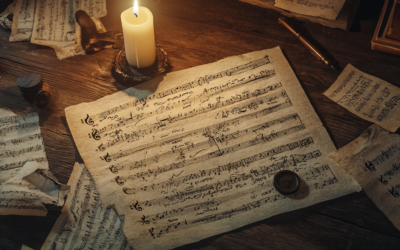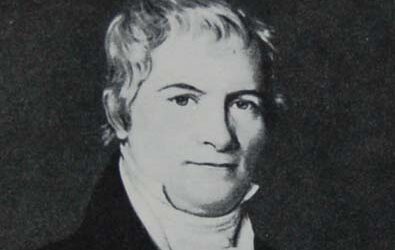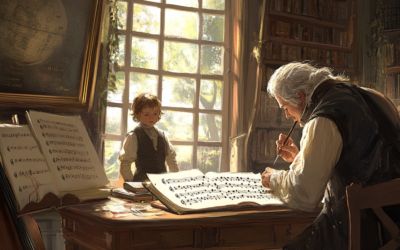The Myth of Mozart:
Debunking the Romantic Virtuoso Image
The image of Mozart as a Romantic-era virtuoso is a misleading anachronism, fuelled by 19th-century propaganda. Wolfgang was no transcendental pianist, but a product of an era where music was more galant than heroic.
Mozart: The Fall of the Gods
This book offers a fresh and critical look at the life of Wolfgang Amadeus Mozart, challenging the myths that have surrounded him for centuries. We strip away the romanticised image of the “natural genius” and delve into the contradictions within Mozart’s extensive biographies. Backed by nearly 2,000 meticulously sourced citations, this work invites readers to explore a deeper, more complex understanding of Mozart. Perfect for those who wish to question the traditional narrative, this biography is a must-read for serious music lovers and historians.
"Mozart’s brilliance was less about transcendental technique and more about the improvisational and expressive subtleties of the galant style."
Mozart: The Fall of the Gods
When we picture the young Mozart, many of us are drawn to the idea of a child prodigy touring Europe, dazzling audiences with his musical prowess. This image, however, is largely a fabrication. It has been shaped by Romantic ideals, associating Mozart with the virtuosos of the early 19th century and the great artists of the Romantic era. Yet, Wolfgang was not a 19th-century pianist whose feats of brilliance left audiences awestruck. Such an image is an anachronism.
The phenomenon of the virtuosic performer as we understand it today began only in the early 1800s. Figures like Paganini and Liszt came to embody the idea of superhuman performers, but this was long after Mozart’s time. By 1840, the piano and the virtuoso had become everyday realities. Mozart, however, belonged to a different era altogether.
Despite this, Wolfgang was later claimed as a symbol by Romantic-era virtuosos. Music publishers, eager to modernise his repertoire, transcribed his works for the piano—music originally written for the harpsichord. Young pianists practised the Minuets from Nannerl’s notebook, hoping to follow in Mozart’s footsteps. Yet, the 19th-century obsession with technical perfection and overcoming challenges was far removed from the world of 18th-century galant music.
“Mozart’s brilliance was less about transcendental technique and more about the improvisational and expressive subtleties of the galant style.”
His improvisational skills, highly praised in his time, were considered emblematic of an absolute and unparalleled mastery. However, this mastery had little to do with the virtuosic acrobatics of the Romantic pianist. It was about understanding and elaborating upon the galant compositions of composers like Telemann and Johann Christian Bach, both of whom had a direct influence on the young Wolfgang.
Mozart’s journey as a performer was marked by improvisation and ornamentation, not the transcendental feats of Romantic virtuosos. In fact, much of the technical brilliance that defined later centuries was still in its infancy during Mozart’s time. His early years as a musician saw him interpreting galant works, not composing transcendentally complex pieces. The romanticisation of Mozart’s abilities has led to a misinterpretation of his music and his era.
You May Also Like
Bohemia or Moravia: Reconfiguring Music History
Why does music history insist on an Austrian narrative, when the contributions of other nations are just as crucial?
The True Caregiver: A Closer Look at Mozart’s Final Days
Who truly cared for Mozart in his final days: his wife Constanze or his sister-in-law Sophie? The True Caregiver unravels this age-old mystery, challenging our perceptions and shedding light on the figures closest to the composer in his last hours.
The Mysterious Origins of Mozart’s K.115
The story of Mozart’s Mass K.115 is one of myth and mistaken identity, pointing not to Wolfgang’s genius but rather to his father Leopold’s hidden influence.
Unveiling the Truth: Mozart in Paris
Unveiling the often-overlooked reality of Mozart’s time in Paris reveals a story of manipulation and deception, far removed from the glorified narratives crafted by his father, Leopold.
The Questionable Legacy of Niemetschek’s Biography
Leopold Mozart’s life was a whirlwind of ambition, deceit, and disappointment—a stark portrait of a man chasing success at any cost.
Leopold Mozart: A Portrait in Shadows
Leopold Mozart’s life was a whirlwind of ambition, deceit, and disappointment—a stark portrait of a man chasing success at any cost.







